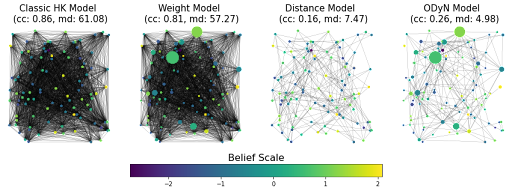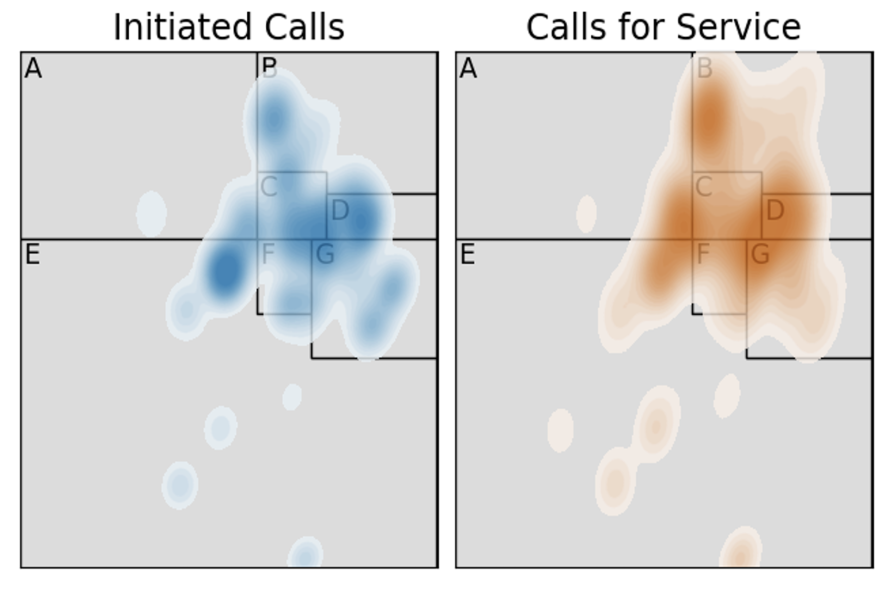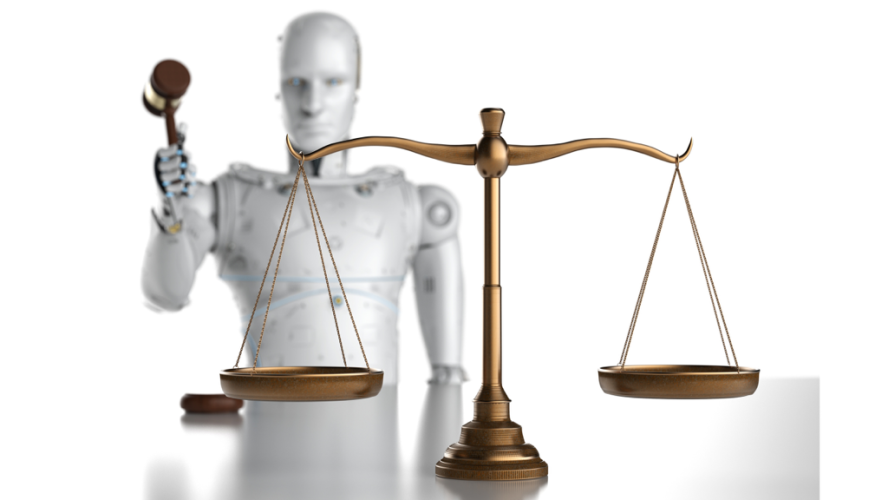Some of the current DISC work focuses on agent-based modeling for social dynamics, ethics of artificial intelligence tools and their impact, and using data science to uncover policy shortfalls and seek improvements. Below are some details about our current projects in the social sciences and humanities area.
Jump to a Project
Hegselmann-Krause Model of Opinion Dynamics
 Holding all other model parameters fixed, the inclusion of weight (second from left), distance (second from right) into the full ODyN model (right-most panel) decreases the overall level of connectivity in both the mean and clustering coefficient
Holding all other model parameters fixed, the inclusion of weight (second from left), distance (second from right) into the full ODyN model (right-most panel) decreases the overall level of connectivity in both the mean and clustering coefficient
Collaboration between DISC (Anna Haensch and Bruce Boghosian) and Tufts Department of Mathematics
Our research group focuses on building models of opinion dynamics using tools from agent based modeling. Specifically we use computer simulations and analytic methods to understand how decisions at the individual or community level can shape collective behavior. One tool we work with often is the Hegselmann-Krause model of opinion dynamics, a nonlinear time-dependent model which allows agents to update their opinions within a fixed confidence bound. We also explore continuations of this model using tools from PDEs and numerical methods. As one domain of application we consider shifts in public opinion around vaccine hesitancy, and we are presently working with panel data on beliefs surrounding the 2020 presidential election. This work also touches on the relationship between voting methods, candidate strategy, and political ideology.
For more information contact Anna Haensch and Bruce Boghosian
References:
- Haensch, A., Dragovic, N., Börgers, C. and Boghosian, B., 2022. “A geospatial bounded confidence model including mega-influencers with an application to Covid-19 vaccine hesitancy.” Journal of Artificial Societies and Social Simulation, Vol. 26, No. 1. [View PDF]
- Börgers, C., Boghosian, B., Dragovic, N., Haensch, A., 2023. "A blue sky bifurcation in the dynamics of political candidates" . To appear in The American Mathematical Monthly. [View PDF]
Precision Nutrition AI Ethics
Collaboration between DISC and HNRCA (Jean Mayer USDA Human Nutrition Research Center on Aging)
Precision nutrition has emerged from the shortcomings of one-size-fits-allapproaches to managing nutritional challenges. It capitalizes on recent advances in biomedical technologies to deliver nutritional guidance to groups of individuals with similar features. Given that Nutrition plays a crucial role in health and social disparities, it is critical to consider the Ethical aspects related to this novel data-intensive approach to Nutrition. This project aims to lay the foundations for Precision Nutrition Data Ethics and to develop a practical tool that provides guidance for scientists, practitioners, and developers.
For more information contact Andreia Martinho

Understanding Disparities in Small Town Policing
Collaboration between DISC (Anna Haensch) and Daanika Gordon (Tufts Sociology), Karin Knudson (ex-DISC), Justina Cheng (Urban and Environmental Policy and Planning - MA Student), SToPA Lab (QSIDE Institute)
Studying small town police departments raises particular challenges since small towns often lack the infrastructure to maintain public data portals. Consequently, it can be difficult to access digital records. In many cases records can only be obtained through a formal records request and can only be delivered in hard copy. Nevertheless, a large-scale analysis requires digitizing paper records which can be both time consuming and technically challenging. As part of this work we’ve constructed a data science pipeline to extract and interpret text using optical character recognition, string matching, spatial statistics and other tools. Our work also focuses on using methods in statistical machine learning and Bayesian inference to analyze the data and uncover disparities in policing along racial and socioeconomic lines. We do this in the context of recent work in sociology on racial disparities in policing and police misconduct.
- Small Town Police Accountability (SToPA) Research Lab Repository https://github.com/qsideinstitute/SToPA
For more information contact Anna Haensch
References:
- Haensch, A., Gordon, D., Knudson, K., & Cheng, J., 2022. “A Multi-method Data Science Pipeline for Analyzing Police Service in the Presence of Misconduct.” SocArXiv. November 5. [View PDF]
 Initiated logs tend to be concentrated in the downtown area of Northville. Responsive logs are also concentrated near downtown but are more spread out, such as in the residential areas of CBGs B and E
Initiated logs tend to be concentrated in the downtown area of Northville. Responsive logs are also concentrated near downtown but are more spread out, such as in the residential areas of CBGs B and E
Surveying Judges on the Implementation of Artificial Intelligence in Legal Systems
Legal AI technologies hold great promise for improving efficiency and accessibility to Justice. However, their deployment entails technical and ethical challenges. This project aims to foster responsible innovation in Justice by surveying judges about the opportunities, vulnerabilities, and challenges of implementing Legal AI technologies in courts.
For more information contact Andreia Martinho

